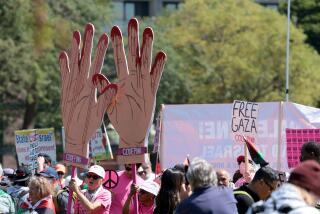Antiwar Rallies Draw Millions Around World
- Share via
PARIS — Millions of protesters opposed to a U.S.-led war on Iraq demonstrated around the world Saturday as anger at the Bush administration moved from the United Nations to jampacked streets.
Protests in Europe included some of the largest antiwar demonstrations in decades, authorities said. And the biggest marches took place in nations that are strong U.S. allies and whose governments support President Bush’s confrontation with Iraqi President Saddam Hussein.
The sea of marchers was another sign that the Iraq crisis has not only embittered U.S. relations with Europe but driven a wedge between many Europeans and their leaders.
At least 1 million people turned out in Britain, which has committed about 45,000 troops to join U.S. forces in the Persian Gulf. Close to 1 million marched in Italy and at least 2 million filled the streets in Spain, both countries where overwhelming antiwar sentiment clashes with official policies favoring the use of force.
Large protests also took place in Paris and Berlin, two capitals leading the opposition in the U.N. to a war. Despite rain, wind and near-freezing temperatures, about 500,000 people gathered in Berlin.
In addition to the students, activists and union members who are ubiquitous at leftist events in Europe, the marches attracted a broader cross-section of participants. In London, the usual array of veteran protesters was bolstered by an eclectic mix of activists, from families with children to representatives of the “sex workers” lobby. Some protesters in Germany waved signs in English, wrapped themselves in U.S. flags and lamented the transatlantic rancor of recent days.
“I don’t demonstrate against the USA,” said Soeren Juergens, 58, a ship engineer from Hamburg, Germany, who lived in Oakland for several years. “I have friends in the USA. But Mr. Bush is isolating the USA from Europe, not vice versa. Don’t get me wrong: I don’t support a dictatorship like Saddam’s regime, but to just drop a bomb on it is like opening a Pandora’s box. This is pure imperialism, even for such an old and conservative guy like me.”
In contrast, the tone of protests was more militant in the Arab world. About 200,000 Syrians chanted anti-American and anti-Israeli slogans in their capital, Damascus. Demonstrations were smaller in U.S.-aligned countries whose security services keep a tight leash on dissent, but a rally in Jordan indicated that the Iraqi dictator’s predicament has made him something of a hero in the Arab world.
About 3,000 protesters in Amman, the Jordanian capital, held aloft portraits of Hussein and accused Arab leaders of staying silent in the face of U.S. aggression. The majority of Jordanians oppose a war, but the government quietly supports American military action while encouraging a peaceful solution.
“Our beloved Saddam, attack Tel Aviv!” protesters shouted in the freezing rain outside U.N. offices in Amman. “You Arab leaders, where are your armies?”
Public Rebuke for Blair
The growing international antiwar movement also made its mark in Asia, Africa, Latin America, New Zealand and Australia, along with the U.S., with turnouts ranging from the hundreds to the tens of thousands.
But for Bush and British Prime Minister Tony Blair, partners struggling to build an international coalition for a possible invasion of Iraq, the mass mobilization in Britain was a very public rebuke. The outpouring made Blair look more isolated than ever in his self-appointed role as a mediator coaxing reluctant allies to craft an agreement in the U.N. Security Council.
Leslie Druce, 70, marched in London carrying a placard that proclaimed “Bush and Blair ... Liars and Bullies.”
“They treat us like we have no power of thought,” Druce said. “Who are they kidding? Do they really feel threatened by the Iraqis? The U.S. could be such a power for good in the world, but Bush has chosen to be the bully boy instead. It really bothers me that Bush has used Blair as a veil of decency through all of this.”
Many protesters were members of Blair’s Labor Party who have broken with their leader over the war.
“We voted for Blair, but on this he’s totally wrong. It’s immoral,” said Peter Burton, who made the 237-mile trip to London from his Exeter home along with his wife, Rita. “He has totally misjudged how dangerous this is to the Middle East and how destabilizing this has been to the United Nations. And we believe in the United Nations.”
Organizers claimed that well over 1 million people marched in London. The official police count of about 750,000 still made the demonstration one of the largest in the city’s history. The marchers walked, occasionally 20 abreast and pausing frequently because of congestion, for more than five hours through the heart of London. They finally congregated in sprawling Hyde Park to hear speeches from political figures such as Mayor Ken Livingstone, who said he had never seen such a massive rally in his career.
“This is all Britain standing together regardless of age, race or sex,” Livingstone said. “So let everyone recognize what has happened here today: Britain does not support this war for oil.”
Playwright Harold Pinter drew cheers when he characterized the U.S. as “a country run by a bunch of criminal lunatics with Tony Blair as a hired Christian thug.”
Italians Bash Berlusconi
Bush and Blair were not the only leaders who came in for criticism on the streets Saturday. Italians marching in Rome heaped abuse on Prime Minister Silvio Berlusconi for his alliance with Bush. And the decision by the state television network not to broadcast live coverage of the protests in Italy revived accusations that Berlusconi, a billionaire media magnate, exerts too much control over private and public media. Some journalists responded by wearing gags to symbolize their disapproval.
Fiammetta Barbieri, a teacher of foreign languages, said Berlusconi has ignored the voters by signing on to a reckless adventure in Iraq.
“I don’t think Berlusconi reflects the will of the Italians regarding war, absolutely not,” she said. “This war is a great danger for us, for the Americans, for the Iraqis, for the people. I am afraid there will be an increase in Islamic terrorism. Because it’s a reaction. You can’t provoke without getting a reaction.”
In Spain, politicians hoping to oust Prime Minister Jose Maria Aznar’s center-right party took part in a march marked by chants demanding that he resign. That is unlikely, but the huge turnout Saturday indicated that Aznar’s Iraq policy could be a potent weapon for Spain’s center-left opposition.
So many people filled downtown Madrid that the marchers did not have room to fall when organizers had them evoke the fate possibly in store for Baghdad.
The turnout in Madrid appeared to be close to 1 million, though marchers estimated 2 million and authorities 600,000. In Barcelona, the municipal police put the number of demonstrators at 1.3 million.
Aznar’s pro-U.S. line “offends the intelligence and the maturity of the majority of Spaniards,” said Jose Luis Rodriguez Zapatero of the Socialist Party.
“I hope Aznar’s position about the war will cost him the next elections,” said demonstrator Juan Antonio, 41. “This demonstration is anti-Bush because Bush is the same as war. He’s crazy, he and his father. He’ll finish what his father started. A great rift has opened between the United States and Europe, but also in NATO, in the U.N., in the world order. I don’t know if that’s what Bush wanted strategically, but he got it.”
French Protests Smaller
In sunny but chilly Paris, protesters numbered more than 100,000.
The turnout was perhaps lower than elsewhere because French voters are in step with their government’s leadership of a U.N. bloc demanding more time for weapons inspectors. Fave Nathalie, a 35-year-old secretary, came to the capital from the suburbs for her first march in a country where demonstrations are rituals for many.
Like others who turned out worldwide Saturday, she felt it was urgent that she express an opinion that could affect world politics before it is too late.
“I’m not sure the Americans will be suicidal enough to go to war with all these protests,” Nathalie said.
The industrious French-bashing in the United States has been echoed by U.S.-bashing here, and Nathalie said both sides share the blame for their dispute.
“The problem with the French is that we are never clear in our policies,” she said. “We are never either completely for or against something. We are always in between.”
Many Americans, Nathalie continued, “put the emphasis on patriotism and forget about impartial information. My sister lives in the U.S., and she says it is incredible how a lot of people are not aware of the whole situation.”
*
Times staff writer Alissa J. Rubin in Vienna contributed to this report, as did Petra Falkenberg and Christian Retzlaff of The Times’ Berlin Bureau, Achrene Sicakyuz of the Paris Bureau and special correspondents William Wallace in London, Cristina Mateo-Yungas in Madrid and Nancy Meiman in Rome.
More to Read
Sign up for Essential California
The most important California stories and recommendations in your inbox every morning.
You may occasionally receive promotional content from the Los Angeles Times.










